|
|
|
Sort Order |
|
|
|
Items / Page
|
|
|
|
|
|
|
| Srl | Item |
| 1 |
ID:
126430
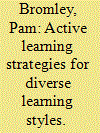

|
|
|
|
|
| Publication |
2013.
|
| Summary/Abstract |
Although political science instructors increasingly recognize the advantages of incorporating active learning activities into their teaching, simulations remain the discipline's most commonly used active learning method. While certainly a useful strategy, simulations are not the only way to bring active learning into classrooms. Indeed, because students have diverse learning styles-comprised of their discrete learning preferences-engaging them in a variety of ways is important. This article explores six active learning techniques: simulations, case studies, enhanced lectures, large group discussion, small group work, and in-class writing. Incorporating these activities into an introductory, writing-intensive seminar on globalization and surveying students about their engagement with course activities, I find that different activities appeal to students with different learning preferences and that simulations are not students most preferred activity. Bringing a broader range of active learning strategies into courses can improve teaching for all students, no matter their learning style.
|
|
|
|
|
|
|
|
|
|
|
|
|
|
|
|
| 2 |
ID:
126411
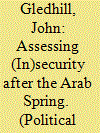

|
|
|
|
|
| Publication |
2013.
|
| Summary/Abstract |
More than two years after the heady days of protest and uprising that characterized the Arab Spring, the glow of revolution has given way to the intricacies and complications of regime building. Coalitions are being formed, constitutions written, judiciaries vetted, and security services (re)built. As collective attention focuses on these complexities of regime restructuring, it is worth noting that a fundamental security paradox sits at the heart of transitions in the Middle East and North Africa. On one hand, individuals who hit the streets or battlefields in support of revolution in 2011 did so in the belief that a new form of government would improve their political, social, and economic security over the long term. On the other hand, subsequent (and ongoing) efforts to draft new rules of the political game have triggered internal conflicts and, on occasion, those conflicts have compromised citizens' physical security over the short term.
|
|
|
|
|
|
|
|
|
|
|
|
|
|
|
|
| 3 |
ID:
126413
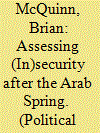

|
|
|
|
|
| Publication |
2013.
|
| Summary/Abstract |
The struggle to shape the narrative of Libya's postwar transition is being fought more intensely outside of the country than within it. The legitimacy of the military intervention in Libya by the West, supported by Qatar and the United Arab Emirates (UAE), has become tied to the perceived success or failure of the transition process: A positive outcome (i.e., the installation of liberal democracy) would legitimize NATO's intervention and, with it, the merits of interventionist military doctrines more broadly; a failure chastens such a policy. Putting aside questions about whether the legitimacy of the intervention should be primarily judged by the outcome of the transition, the practical consequence of this ulterior motive for judging the success or failure of the transition has warped international coverage of Libya. It has created incentives for observers to cherry-pick their portrayal of events so that they can present unambiguous conclusions about the progress of reforms and the transition in general (Rubin 2013; Wagner and Cafiero 2013). This myopia is unhelpful; it distorts international policy on Libya and results in scant analysis of the underlying (and often antithetic) social, political, or security dynamics shaping the transition. To remedy this, the following analysis examines the micropolitics of violence undergirding Libya's transition. As its basis John Gledhill's tripartite framework is used for understanding the causal pathways to collective violence during political transition (see "Editor's Introduction"). The contributions on Yemen and Egypt, which follow this article, also adopt Gledhill's framework, permitting comparison among these cases.
|
|
|
|
|
|
|
|
|
|
|
|
|
|
|
|
| 4 |
ID:
126414


|
|
|
|
|
| Publication |
2013.
|
| Summary/Abstract |
In January 2011, youth and civil society activists, inspired by protests in Tunisia, took to Yemen's streets calling for regime change. As in other Arab Spring countries, conditions were ripe for mobilization as large sections of the population had become increasingly frustrated with corruption, dwindling economic prospects, and a concentration of power and wealth in the hands of the ruling clique. Following Hosni Mubarak's resignation in Egypt, protests mounted across Yemen, and, although President Ali Abdullah Saleh promised reform, it was too little, too late, to satisfy the demonstrators (see ICG 2011a). After proregime gunmen fired on unarmed protesters in Sanaa on March 18, 2011-killing more than 50 demonstrators-a series of high-level defections began, including long-time regime insider and powerful military commander, Major General Ali Mohsen al-Ahmar.
|
|
|
|
|
|
|
|
|
|
|
|
|
|
|
|
| 5 |
ID:
126415
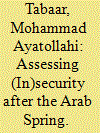

|
|
|
|
|
| Publication |
2013.
|
| Summary/Abstract |
In nearly three years, Egypt has transitioned from a large-scale uprising against one of the region's longest-standing rulers to an even more massive revolt that led to the military ousting the country's first democratically elected president, Mohamed Morsi. Between the two popular uprisings, new pacts and unlikely alliances emerged, deepened, and, in some cases, then disappeared. For its part, the army evolved from being an accomplice of the old regime, to then being an uneasy partner of the ascendant Muslim Brotherhood and, most recently, on to rebranding itself as an ally of non-Islamists and a protector of the popular will. Loosely aligned liberals, leftists, and nationalists, meanwhile, shifted from offering support for democratic elections to backing a "democratic" coup out of fear that the elected Islamists might monopolize and never relinquish power in a conservative new regime. That fear came in response to the Brotherhood's own shifting position, which moved from a commitment to "participation not domination" to a strategy of controlling the legislature and the presidency, although they were ultimately forced back into hiding before they could neutralize the judiciary and the army. And finally, the other Islamist movement, the ultraconservative Salafists, initially displayed no interest in the political process, but then mobilized and ultimately enjoyed striking success in the elections of 2011-12. Surprisingly, however, despite their presumed ideological proximity to the Brotherhood, many Salafists went on to back the military's removal of Morsi in July 2013, but then did not lend support to the interim government that was constructed in wake of Morsi's fall. In this multilayered, fast-paced political environment, mass protests, arrests, and violence have become routine.
|
|
|
|
|
|
|
|
|
|
|
|
|
|
|
|
| 6 |
ID:
126425
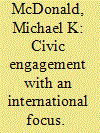

|
|
|
|
|
| Publication |
2013.
|
| Summary/Abstract |
Recent trends in political science include civic engagement and experiential education pedagogy, but this has been notably absent from courses on international relations and comparative politics. This article discusses how I designed an international civic engagement experience for students-without leaving campus. I echo other scholars' claim that civic engagement pedagogy can and should be used in courses with an international focus, and I provide one example of how to go about that task.
|
|
|
|
|
|
|
|
|
|
|
|
|
|
|
|
| 7 |
ID:
126418
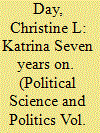

|
|
|
|
|
| Publication |
2013.
|
| Summary/Abstract |
After Hurricane Katrina struck the Gulf Coast in 2005, flooding the city of New Orleans for several weeks after levees collapsed, the city struggled to recover and rebuild. Scholars and activists participating in the roundtable, "Katrina Seven Years On: The Politics of Race and Recovery," at the 2012 APSA Annual Meeting in New Orleans, were to discuss recovery and racial justice in post-Katrina urban planning and rebuilding efforts, grassroots movements, job recovery, fair housing, and cultural revival. Although the 2012 meeting was canceled as Hurricane Isaac threatened New Orleans anew, panelists offered their observations and ideas to be summarized for PS readers.
|
|
|
|
|
|
|
|
|
|
|
|
|
|
|
|
| 8 |
ID:
126416
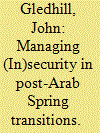

|
|
|
|
|
| Publication |
2013.
|
| Summary/Abstract |
The long-established authoritarian regimes in Libya, Yemen, and Egypt were very different in form. It is not surprising, therefore, that the way in which those regimes came to an end in 2011 varied significantly across cases. Nor is it surprising that the dynamics of transition in those cases have also varied since the Arab Spring. That said, the studies in this symposium have shown that, despite their many differences, processes of regime transition in Libya, Yemen, and Egypt have also shared two significant traits. First, disagreements among stakeholders over basic questions of institutional design have generated intense uncertainty about the nature of posttransition regimes. Second, political and military actors have occasionally turned to violence, in an effort to "resolve" their disagreements through force. In our symposium, we have tried to clarify the relationship between these shared traits of uncertainty and violence. To do this, we have disaggregated the concept of transitional uncertainty, considered the degree to which different forms of uncertainty have already fomented insecurity in post-Arab Spring states, and offered assessments of whether uncertainty may (continue to) prove destabilizing in those states going forward.
|
|
|
|
|
|
|
|
|
|
|
|
|
|
|
|
| 9 |
ID:
126417
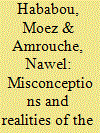

|
|
|
|
|
| Publication |
2013.
|
| Summary/Abstract |
In response to the 2011 Tunisian elections and the uncertainty surrounding Tunisia's future, we offer an empirical explanation of the election's results using socioeconomic and demographic variables. We aggregate many political analyses to describe the main parties and give insights into their strengths and weaknesses. We also examine common misconceptions advanced during the elections. Finally, we include a proposed electoral map that could be used by politicians to plan their future political strategies.
|
|
|
|
|
|
|
|
|
|
|
|
|
|
|
|
| 10 |
ID:
126422
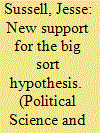

|
|
|
|
|
| Publication |
2013.
|
| Summary/Abstract |
This article empirically examines the "Big Sort hypothesis"-the notion that, in recent years, liberal and conservative Americans have become increasingly spatially isolated from one another. Using block group-, tract-, and county-level party registration data and presidential election returns, I construct two formal indices of segregation for 1992-2010 in California and evaluate those indices for evidence of growth in the segregation of Californians along ideological lines. Evidence of rising geographic segregation between Democrats and Republicans for measures generated from both party registration and presidential vote data is found. This growth is statistically significant for 10 of the 12 segregation measures analyzed. In addition, many of the increases are practically significant, with estimates of growth in segregation during the observation period ranging from 2% to 23%.
|
|
|
|
|
|
|
|
|
|
|
|
|
|
|
|
| 11 |
ID:
126433


|
|
|
|
|
| Publication |
2013.
|
| Summary/Abstract |
Previous research indicates that undergraduate research activities promote student-faculty collaborations and have a positive impact on students, faculty, and institutions. A review of 13 active undergraduate political science journals indicates that these publications take a variety of approaches in format, frequency, and submission requirements. Further, a survey of undergraduate political science journal editors shows that the role of students and faculty and the sources of support for journal publication vary considerably. Finally, case studies of the undergraduate journal experience at three different institutions suggest that political science journals promote student engagement and student-faculty collaboration.
|
|
|
|
|
|
|
|
|
|
|
|
|
|
|
|
| 12 |
ID:
126429
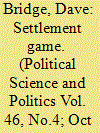

|
|
|
|
|
| Publication |
2013.
|
| Summary/Abstract |
Many political science subfields use classroom simulations. Public law, however, suffers from a lack of such activities. Many mock trials exist, but these games focus on jurisprudence and not on the more institutional aspects of the subfield. This article presents the Settlement Game, an original simulation that takes 15 minutes to complete and helps teach important institutional theories such as adversarial legalism, "bargaining in the shadow of the law," and "haves" versus "have-nots" concepts heretofore overlooked by the simulations literature. I introduce relevant theories and describe how the simulation works, discussing preclass assignments, its operation, and debriefing about its connection to theory. I close with comments about assessment of students and explain why the Settlement Game is useful.
|
|
|
|
|
|
|
|
|
|
|
|
|
|
|
|
| 13 |
ID:
126424


|
|
|
|
|
| Publication |
2013.
|
| Summary/Abstract |
The conventional wisdom about political science international education assumes that students choose between short "island" study abroad programs that are accessible but have only superficial impact, and longer immersion programs, achieving a greater effect. This article argues that well-designed study abroad programs can combine the best of both models to achieve significant impact even in a short program. It proposes a "bridge model" for reconceptualizing study abroad not as a discrete event with more or less impact on student learning, but as a key intervention that furthers a student's overall development within an internationalized curriculum. The article examines the case of a peacebuilding study abroad program in Ecuador. It measures alumni perceptions of impact, objective outcomes, and alumni network development. The key finding is that solid program design and structured cross-cultural interaction produces the type of long-term effect and networks traditionally associated with immersion programs.
|
|
|
|
|
|
|
|
|
|
|
|
|
|
|
|
| 14 |
ID:
126426


|
|
|
|
|
| Publication |
2013.
|
| Summary/Abstract |
Political science instructors commonly emphasize the importance of effective writing. However, it is unclear that students either understand or share the norms about what this entails. A notable example is the appropriate use of voice. Prior literature has shown that academic writers often believe it is appropriate to use the pronoun "I" for a variety of rhetorical purposes but suggests that students may be unaware of this reasoning. We examine this topic by determining more precisely how commonly "I" is used in a major political science journal, conducting a survey of political science undergraduate students at a large comprehensive university, and interviewing political science faculty at the same university. Although each group's attitudes are complex, we find evidence that students' views commonly conflict with disciplinary norms. We close by considering the implications for teaching about writing in political science.
|
|
|
|
|
|
|
|
|
|
|
|
|
|
|
|
| 15 |
ID:
126423


|
|
|
|
|
| Publication |
2013.
|
| Summary/Abstract |
The Socially Mediated Internet Survey (SMIS) method is a cost-effective technique used to obtain web-based, adult samples for experimental research in political science. SMIS engages central figures in online social networks to help recruit participants among visitors to these websites, yielding sizable samples for experimental research. We present data from six samples collected using the SMIS method and compare them to those gathered by other sampling approaches such as Amazon's Mechanical Turk. While not representative of the general adult population, our SMIS samples are significantly more diverse than undergraduate convenience samples, not only demographically but also politically. We discuss the applicability of the method to experimental research and its usefulness for obtaining samples of special, politically relevant subpopulations such as political sophisticates and activists. We argue that the diversity of SMIS samples, along with the ability to capture highly engaged citizens, can circumvent questions about the artificiality of political behavior experiments entirely based on student samples and help to document sources of heterogeneous experimental treatment effects.
|
|
|
|
|
|
|
|
|
|
|
|
|
|
|
|
| 16 |
ID:
126420


|
|
|
|
|
| Publication |
2013.
|
| Summary/Abstract |
In 2010, a debate erupted about plans to construct a mosque (as part of a larger multicultural center) approximately two blocks from Ground Zero in New York City. The main justification given by those who opposed the mosque was that building it so close to Ground Zero would appear to be insensitive. Public opinion appeared to support this notion, as large majorities of Americans registered their opposition to the mosque in surveys conducted at the time. In this article, I examine whether distance was, in fact, an important factor influencing citizens' opposition to the mosque. Using a survey experiment, I asked for opinions on the building of a mosque while randomizing how far the mosque was located from Ground Zero. Results from the experiment indicate that opposition to the mosque was unaffected by how far the mosque would be located from Ground Zero, but strongly influenced by factors such as partisanship, ideology, and tolerance for out groups.
|
|
|
|
|
|
|
|
|
|
|
|
|
|
|
|
| 17 |
ID:
126421


|
|
|
|
|
| Publication |
2013.
|
| Summary/Abstract |
Many scholars argue that retrospective voting is a powerful information shortcut that offsets widespread voter ignorance. Even deeply ignorant voters, it is claimed, can effectively punish incumbents for bad performance and reward them if things go well. But if voters' understanding of which officials are responsible for which outcomes is systematically biased, retrospective voting becomes an independent source of political failure rather than a cure for it. We design and administer a new survey of the general public and political experts to test for such biases. Our analysis reveals frequent, large, robust biases in voter attributions of responsibility for a variety of political actors and outcomes with a tendency for the public to overestimate influence, although important examples of underestimation also exist.
|
|
|
|
|
|
|
|
|
|
|
|
|
|
|
|
| 18 |
ID:
126432


|
|
|
|
|
| Publication |
2013.
|
| Summary/Abstract |
Instant-response technologies, or clickers, are student response devices that help address some of the challenges involved in teaching large classes, namely student motivation and engagement with the material. This article evaluates a diverse set of teaching and learning strategies enabled by clicker technology and their impact on student learning. We highlight five aspects of teaching that are enhanced by the use of clickers, describe an experiment comparing student performance in traditional and clicker lectures, and report results of a survey of student perception about the effects of this technology on motivation, learning, and engagement. We argue that while the use of clickers is time-consuming for the instructor and presents a steep learning curve, clickers improve teaching effectiveness in large classes and hold promise for increasing student learning.
|
|
|
|
|
|
|
|
|
|
|
|
|
|
|
|
| 19 |
ID:
126427
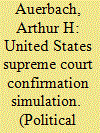

|
|
|
|
|
| Publication |
2013.
|
| Summary/Abstract |
The traditional process of educating undergraduates is often relegated to the passive lecturing format. One means of engaging students in active learning is through the use of simulations. Students were asked to take on the roles of United States senators and a Supreme Court nominee during a United States Supreme Court confirmation hearing simulation. Each student participated by researching a sitting senator and the nominee selected and engaged in a question-and-answer session as is done in the Senate Judiciary Committee. Students came away from this valuable experience by not only learning a great deal about the operation of the confirmation hearing as well as the substantive material learned but participating in a process that few people will ever actually experience.
|
|
|
|
|
|
|
|
|
|
|
|
|
|
|
|
|
|
|
|
|